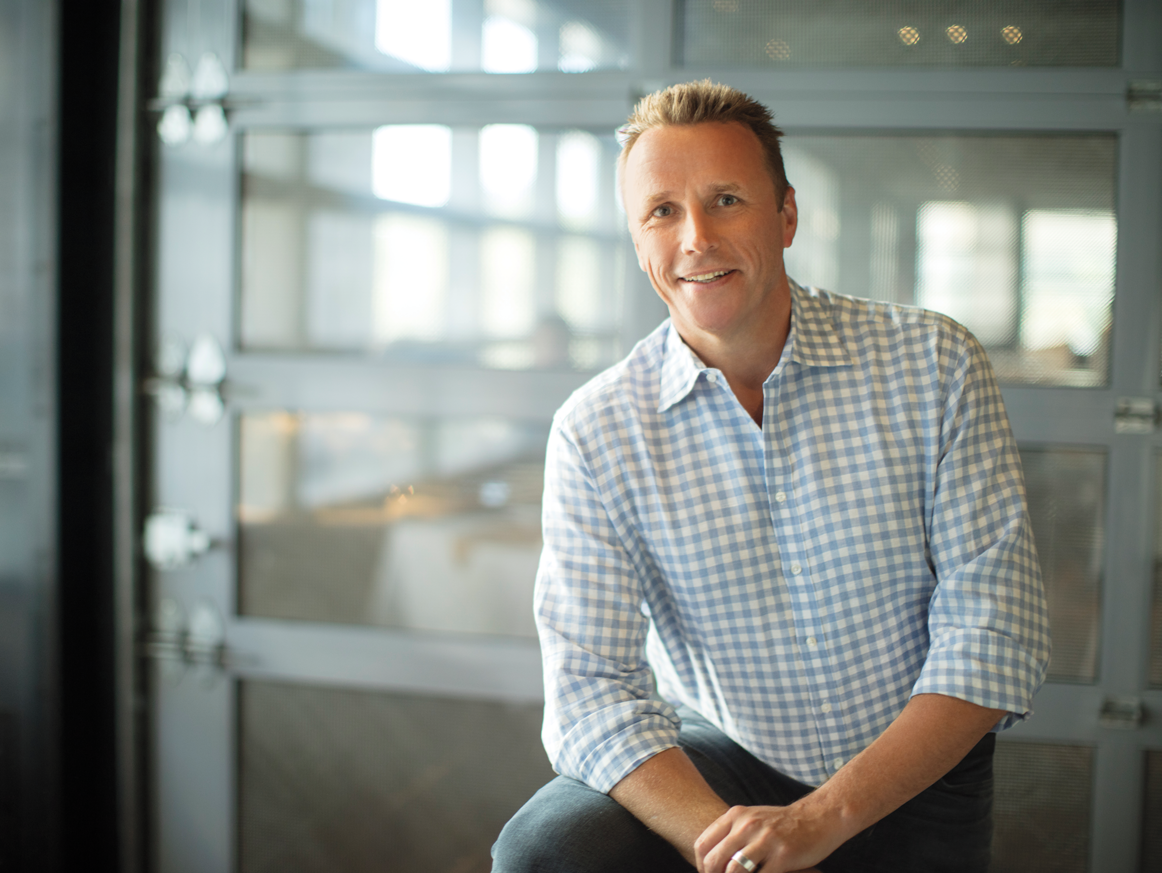Stints as a cruise-ship clown, choreographer’s assistant, and race car driver had left him with great stories, but not much in the way of résumé entries, so he worked as a handyman for his brother and future sister-in-law’s friends, and cooked them dinner every night. Growing tired of Marc’s obsession with soufflés, his brother brought him to check out the Institute of Culinary Education. That’s when Murphy realized that he’d actually been training to be a chef since birth. “You develop your palate when you’re young and I lived in good countries to do that,” he says. “My food is where I’ve experienced my life—France, Italy and America.” After honing his craft at one Michelin-starred restaurant in Paris, he returned to the city where he once built bookshelves, and eventually built a culinary empire. Now he reinterprets the flavors of his past in his five restaurants, which include two bistro-style Landmarc outposts; the New American cuisine at Kingside in Manhattan’s Viceroy hotel; Ditch Plains, a modern fish shack inspired by his off-days “trying to surf” in Montauk; and Grey Salt, a Mediterranean spot in the Seminole Hard Rock Hotel & Casino in Tampa, Florida. Along with appearing on virtually every food-centered TV show, last year Murphy released a cookbook, Season with Authority: Confident Home Cooking. “Some of my favorite times have been eating and drinking with friends around our table,” he says. “It’s really fun to think that now someone can sit around their house with a bunch of friends, having a bowl of my carbonara.” Looking towards a season that’s all about friends, family and food, Murphy sat down with Serendipity at the Landmarc in the Time Warner Center and shared his thoughts on cooking, travel and life, as well as a few of his favorite recipes.
Did you learn to cook as a kid?
No, but I learned how to eat, and I think that’s more important than knowing how to cook because you get to that later. When you’re five, you’re eating, not working with open flames and knives. My daughter is 13, my son is 9, so they can start getting into it, but they’re still not exactly lifting braising pans.
You traveled so much growing up. Where do you consider home now?
New York City. I’ve been here now for over 25 years off and on; I decided early on this is where I was going to settle. On your days off you can go have great Indian food, you can have great Chinese food, you can have great food all over the place. When you live in Rome, there’s one Chinese restaurant that sucks.
Were there any skills you developed while working as a clown, choreographer’s assistant, and race car driver, that you use as a chef?
It was all just about [developing] people skills. In the restaurant industry, you’re dealing with everyone from the plumber and the guy who fixes the air conditioning to the guy who might be investing in your restaurant who could be in a hedge fund. Or here [at the Landmarc in the Time Warner Center], all the newscasters from CNN. It is such a varied palette of people who come through the doors, and not just the front doors but also the back doors.
When did you know you had made it as a chef?
I’m not sure I have. You’re only as good as the last meal you served. You have to keep striving to be better; you have to stay with the times.
In December, you’ll have been married for 14 years. Where did you meet your wife?
An old friend of mine from my handyman days introduced us. I went to help this woman build a hat shop, Ann Moore’s hat shop on 61st and Lex. And she had this brother who did something on Wall Street, so at night, he would come by with a six-pack and pretend like he was going to help me. I thought, “This guy’s useless,” but we got to be really good friends. A couple of years later when I was already a chef, he goes and opens up a magazine called Madison with my wife. He calls me up, and goes, “Hey, I need somebody to write the food column. You’re the only chef I know, come and talk to us.” I met with him and her and I was like, “I’m dyslexic and I can’t write a thing, but I’d like to talk to her some more.” It didn’t happen right away, but a couple of years later we ended up getting together.
You didn’t think you could write an article, but you ended up writing a cookbook. What was that like?
Luckily I had [someone] help me write the book. The experience was great. It was my first book so I could do all the things I love from my past. Every recipe has a little blurb about where it came from, what it reminds me of, where I learned it, where I started eating it…I wanted it to represent me and my journey with food, but I also did not want to put any recipes in that were crazy difficult. I feel like a lot of cookbooks just get thrown in the corner and I want mine to be used.
Do you have any advice for home cooks looking to get better?
You really have to be comfortable with your knife skills. I think that unlocks a fear of cooking. When my wife wants to cook something, she’ll say, “Oh, can you cut the onion? It just takes me so long.” It doesn’t take long to cut an onion six different ways if you have good knife skills. I always say, go to a local cooking school and go to a knife skills class. And the other thing I tell people is, don’t be scared. If you screw something up, and you’re a brain surgeon, it’s probably a problem. But if you mess up the boeuf bourguignon, you feed it to the dog, have a salad, call it a night and we’ll try again tomorrow.
What’s your general philosophy on presenting food?
To me, food is food, it doesn’t have to stand up high. I don’t want to have to knock my food down before I have to eat it.
After a long day at work, what do you cook for yourself?
It depends on who’s with me. With my kids, whipping up a bowl of pasta is easiest, but my wife doesn’t like to eat as much pasta anymore because she thinks it’s bad for you—you know, the whole carb thing. We’ve really got to get people back to eating bread, carbs. It’s so good. Anyway, what I make also depends on where I am. At our beach house, I love marinating lamb chops and throwing them on the grill. That is a perfect meal with some easy salads. It depends on my mood, too. If I’m shooting Chopped and I’ve been eating all this whackadoodle food all day, I go home and the last thing I want is something complicated. I would want a Caesar salad, with maybe some salmon on it, something straightforward that doesn’t attack my senses too strongly.
What’s the best thing about being a judge on Chopped?
Everybody has a story, and it’s great to see those stories in front of us. But I also love watching some crazy people come up with crazy things from the same ingredients. Everybody pulls from different resources and past experiences. It’s beautiful to be able to see some of these ingredients the producers find. We had something on there the other day called dogfish, which not many people eat. Obviously, I told them they should probably change the name—maybe people would eat it more. I had never eaten it before and we had three chefs cook it three different ways. It was amazing one way and another way it got really dried out quickly. It’s always interesting to see the ingredients and see how they transform them.
What’s the worst thing about judging Chopped?
People get really disappointed when they lose. I just have to remind them, only one of you, 25 percent of you will win; 75 percent of you will lose. It’s hard when they really take it out on themselves. And when that happens I tell them…this is a game show. You don’t cook like this at home. It’s really difficult. I’ve had to compete before. I just walk into the kitchen and start peeling onions. I have no idea what I’m making, but I figure I’ll probably need an onion, so at least you’re doing something while you’re thinking about it.
What about the rest of your job? What’s the best and worst thing about being a chef?
My favorite thing about this job is that I get to work with amazing people I love, from the front of the house to the back of the house. And we don’t have to wear ties. The worst thing? I don’t know. I like it all.
Tell me about your work with the State Department’s Culinary Diplomatic Program.
Being a culinary diplomat is about us going out and promoting America in a culinary perspective, because I think a lot of people don’t really think of us in that way. For example, if you’re the American ambassador and you go to the Japanese ambassador’s house, there’s probably some kind of ritual with a tea ceremony to greet you. When you go to the American embassy, what do you get, milk and cookies? But when you think about it, we do have amazing depths of culinary history, from New Orleans to Maine to California, Wisconsin cheeses, and it’s great to be able to go out and remind people. I did a TV show with a Turkish chef in Istanbul and the people from the embassy were like, you probably reached over half a million people with good will in Turkey, where people may not think we’re not the greatest country in the whole world, and they’re seeing two chefs who don’t speak the same language cooking like brothers in arms. Another time I met the head chef at the Hilton in Tel Aviv who lives in Palestine and crosses the border to work. And it’s a beautiful thing to see but also sad to see, because chefs don’t give a crap about politics, they just want to cook food.
Of the places you still haven’t been, where would you most like to travel?
I’m desperately trying to organize a trip for me and my friends to go to Japan. And hopefully by the time this article is printed, I’ll have been there. Besides that, I will literally go anywhere.
If you had one last meal left on earth, what would you eat and where would you eat it?
A big bowl of carbonara. My brother and his friends have a house [in Italy] outside of Spoleto in a little town called Roselli where I lived for a while, redid all the electrical, and rebuilt the roof. There’s a grape arbor on the terrace and I could sit under that grape arbor and look out over the Umbrian valley.
Photographs by Conor Doherty




